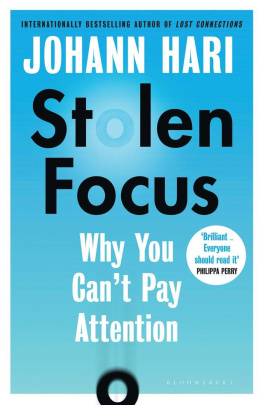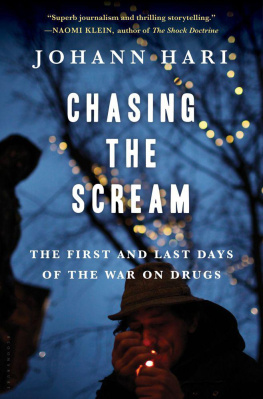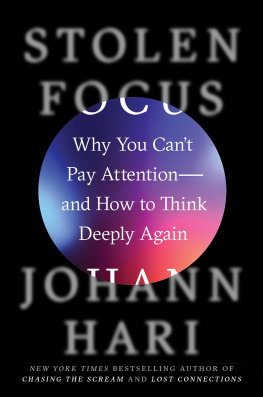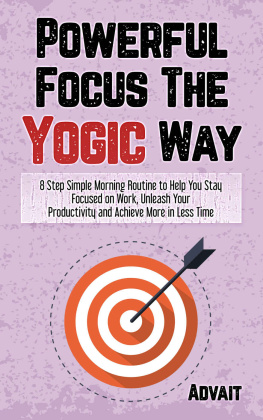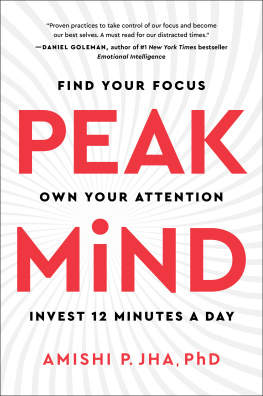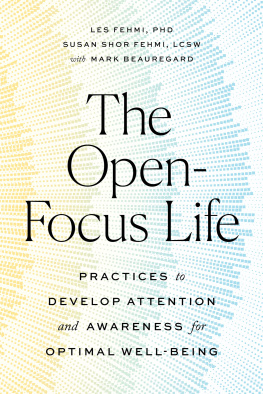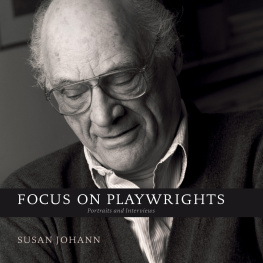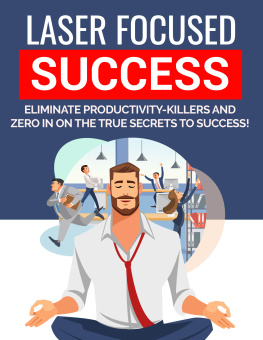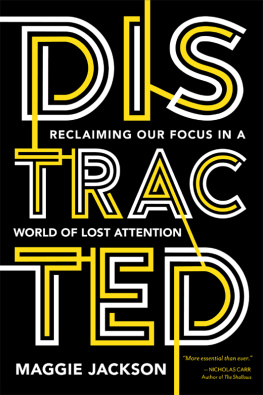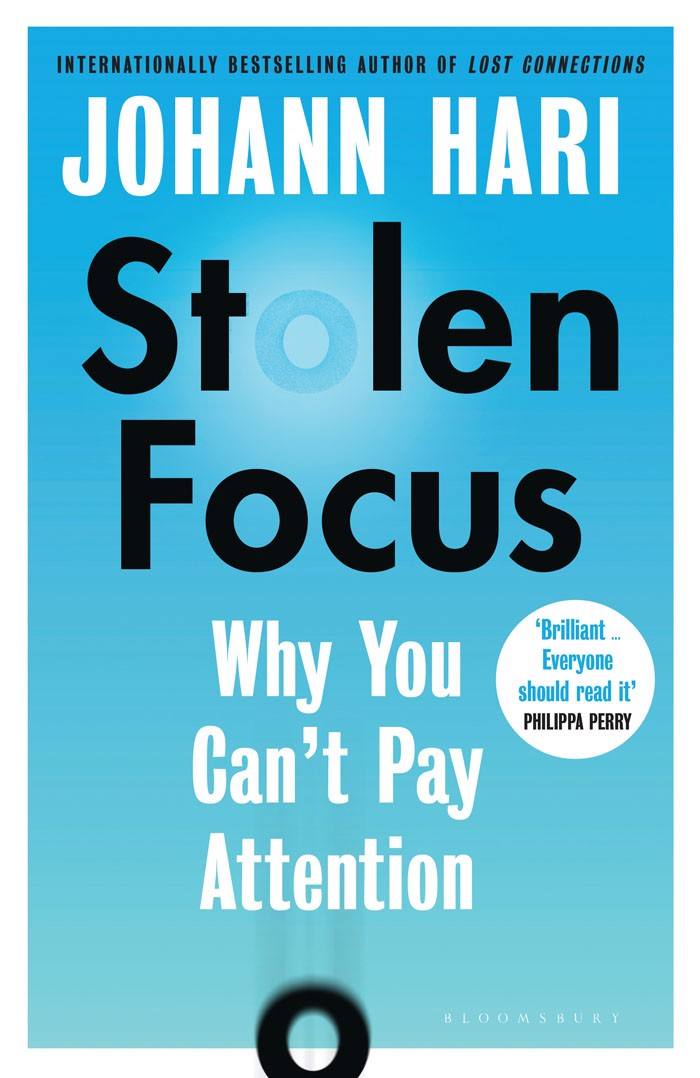
Stolen Focus
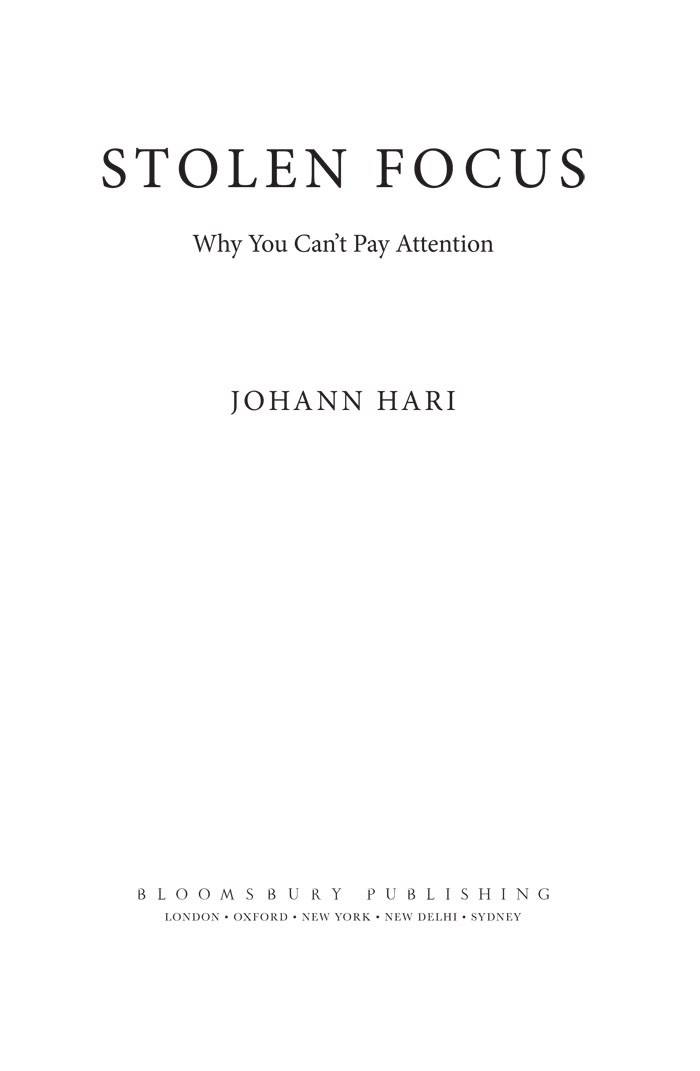
BLOOMSBURY PUBLISHING
Bloomsbury Publishing Plc
50 Bedford Square, London, WC1B 3DP, UK
29 Earlsfort Terrace, Dublin 2, Ireland
BLOOMSBURY, BLOOMSBURY PUBLISHING and the Diana logo are trademarks of Bloomsbury Publishing Plc
First published in Great Britain 2022
This electronic edition first published in 2022
Copyright Johann Hari, 2022
Johann Hari has asserted his right under the Copyright, Designs and Patents Act, 1988, to be identified as Author of this work
For legal purposes the constitute an extension of this copyright page
All rights reserved. No part of this publication may be reproduced or transmitted in any form or by any means, electronic or mechanical, including photocopying, recording, or any information storage or retrieval system, without prior permission in writing from the publishers
Bloomsbury Publishing Plc does not have any control over, or responsibility for, any third-party websites referred to in this book. All internet addresses given in this book were correct at the time of going to press. The author and publisher regret any inconvenience caused if addresses have changed or sites have ceased to exist, but can accept no responsibility for any such changes
A catalogue record for this book is available from the British Library
ISBN: HB: 978-1-5266-2022-4; TPB: 978-1-5266-2016-3; EBOOK: 978-1-5266-2024-8; EPDF: 978-1-5266-4711-5
To find out more about our authors and books visit www.bloomsbury.com and sign up for our newsletters
BY THE SAME AUTHOR
Chasing the Scream: The First and Last Days of the War on Drugs
Lost Connections: Uncovering the Real Causes of Depression and the Unexpected Solutions
For my grandmothers, Amy McRae and Lydia Hari
I have posted audio clips of all the people I quote in this book on the website, so as you read this book, you can listen along to our conversations. Go to www.stolenfocusbook.com/audio
Contents
When he was nine years old, my godson developed a brief but freakishly intense obsession with Elvis Presley. He took to singing Jailhouse Rock at the top of his voice, with all the low crooning and pelvis-jiggling of the King himself. He didnt know this style had become a joke, so he offered it with all the heart-catching sincerity of a pre-teen who believes he is being cool. In the brief pauses before he started singing it all over again, he demanded to know everything (Everything! Everything!) about Elvis, and so I jabbered out the rough outline of that inspiring, sad, stupid story.
Elvis was born in one of the poorest towns in Mississippi a place far, far away, I said. He arrived in the world alongside his twin brother, who died a few minutes later. As he grew up, his mother told him that if he sang to the moon every night, his brother could hear his voice, so he sang and sang. He began to perform in public just as television was taking off so in a sudden swoosh, he became more famous than anyone had ever been before. Everywhere Elvis went, people would scream, until his world became a chamber of screams. He retreated into a cocoon of his own construction, where he gloried in his possessions in place of his lost freedom. For his mother he bought a palace and named it Graceland.
I skimmed through the rest the descent into addiction, the sweating, gurning stage-jammering in Vegas, the death at the age of forty-two. Whenever my godson, who Ill call Adam Ive changed some details here to avoid identifying him asked questions about how the story ended, I got him to duet Blue Moon with me instead. You saw me standing alone, he sang in his little voice, without a dream in my heart. Without a love of my own.
One day, Adam looked at me very earnestly and asked: Johann, will you take me to Graceland? Without really thinking, I agreed. Do you promise? Do you really promise? I said I did. And I never gave it another thought, until everything had gone wrong.

Ten years later, Adam was lost. He had dropped out of school when he was fifteen, and he spent literally almost all his waking hours at home alternating blankly between screens his phone, an infinite scroll of Whatsapp and Facebook messages, and his iPad, on which he watched a blur of YouTube and porn. At moments, I could still see in him traces of the joyful little boy who sang Viva Las Vegas, but it was like that person had broken into smaller, disconnected fragments. He struggled to stay with a topic of conversation for more than a few minutes without jerking back to a screen or abruptly switching to another subject. He seemed to be whirring at the speed of Snapchat, somewhere where nothing still or serious could reach him. He was intelligent, decent, kind but it was like nothing could gain any traction in his mind.
During the decade in which Adam had become a man, this fracturing seemed to be happening to some degree to many of us. The sensation of being alive in the early twenty-first century consisted of the sense that our ability to pay attention to focus was cracking and breaking. I could feel it happen to me I would buy piles of books, and I would glimpse them guiltily from the corner of my eye as I sent, I told myself, just one more tweet. I still read a lot, but with each year that passed, it felt more and more like running up a down escalator. I had just turned forty, and wherever my generation gathered, we would lament our lost capacity for concentration, as if it was a friend who had vanished one day at sea and never been seen since.
Then one evening, as we lay on a large sofa, each staring at our own ceaselessly shrieking screens, I looked at Adam and felt a low dread. We cant live like this, I said to myself.
Adam, I said softly. Lets go to Graceland.
What?
I reminded him of the promise I had made to him so many years before. He couldnt even remember those Blue Moon days, nor my pledge to him, but I could see that the idea of breaking this numbing routine ignited something in him. He looked up at me and asked if I was serious. I am, I said, but theres one condition. Ill pay for us to go four thousand miles. Well go to Memphis, and New Orleans well go all over the South, anywhere you want. But I cant do it if, when we get there, all youre going to do is stare at your phone. You have to promise to leave it switched off except at nights. We have to return to reality. We have to reconnect with something that matters to us. He swore he would, and a few weeks later, we lifted off from London Heathrow, towards the land of the Delta blues.

When you arrive at the gates of Graceland, there is no longer a human being whose job is to show you around. You are handed an iPad, and you put in little earbuds, and the iPad tells you what to do turn left; turn right; walk forward. In each room, the iPad, in the voice of some forgotten actor, tells you about the room you are in, and a photograph of it appears on the screen. So we walked around Graceland alone, staring at the iPad. We were surrounded by Canadians and Koreans and a whole United Nations of blank-faced people, looking down, seeing nothing around them. Nobody was looking for long at anything but their screens. I watched them as we walked, feeling more and more tense. Occasionally somebody would look away from the iPad and I felt a flicker of hope, and I would try to make eye contact with them, to shrug, to say, Hey, were the only ones looking around, were the ones who travelled thousands of miles and decided to actually see the things in front of us but every time this happened, I realised they had broken contact with the iPad only to take out their phones and snap a selfie.
Next page
